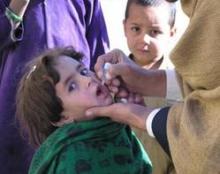Despite the killings of polio vaccine workers in Pakistan and Nigeria late last year and into this year, the worldwide campaign to eradicate polio refuses to back off. In late April, the Global Polio Eradication Initiative defiantly issued an updated timetable that calls for the last wild polio infection to occur sometime in late 2014, less than 2 years from now, and for certification of eradication to follow 3 years later, by late 2017.
I wish them the best. It’s exciting to think that a second human disease can be wiped from Earth within the next 5 years. It’s exciting just to know that physicians, researchers, public health officials, philanthropists, and politicians from around the world think that polio eradication is close enough to envision, talk about, and plan for seriously.
On April 25, at the Global Vaccine Summit in Abu Dhabi, the Global Polio Eradication Initiative (GPEI), a consortium that includes the World Health Organization and the Centers for Disease Control and Prevention, issued its Polio Eradication & Endgame Strategic Plan 2013-2018, a roadmap for how participating organizations can make this infectious disease dream come true and then certify its accomplishment.
Especially notable is that the new plan acknowledges the safety issue and outlines steps to deal with it.
"The tragic, targeted killings of health workers in late 2012 and early 2013 in Pakistan and Nigeria present a new threat," according to the plan. "However, governments and partners have initiated a number of adjustments to improve safety in specific areas and to ensure the continuity of campaigns."
The plan calls the inability of health workers to function in and deliver vaccine to children in areas of insecurity in Pakistan and Nigeria "the most serious implementation risk," but it notes that "the leaders of Afghanistan, Nigeria, and Pakistan remain fully committed at all levels to stop the transmission of polio in their respective countries, and efforts are under way to address the security challenges."
The GPEI has developed an overarching framework for insecure areas that is being tailored to each setting. Basic elements of the framework aim to:
• Reduce the exposure of the program and vaccinators to potential threats by holding campaigns of shorter duration or lower profile.
• Enhance coordination between civilian and security services to inform local risk assessments, integrate these into operations plans, and, where necessary, provide security to improve the physical safety of vaccinators and facilities.
• Improve local community demand to increase access to vaccination and basic health services through a combination of awareness-raising activities related to the disease, its consequences and its prevention, and, where helpful, by coupling oral polio vaccine with the delivery of other services/interventions.
• Markedly step up advocacy by international, national, and local Islamic leaders to build ownership and solidarity for polio eradication across the Islamic world, including for the protection of children against polio, the sanctity of health workers, and the neutrality of health services.
• Take steps to reduce the spread risk from insecure areas through measures such as intensive vaccination in surrounding areas and the vaccination of travelers moving in and out of the infected areas.
The new plan also identifies another danger that it says poses more of a risk than targeted killings of vaccination personnel: not enough money. The document says that right now "the greatest risk is insufficient funding for the 6-year US$ 5.5 billion budget."
At the Global Vaccine Summit, Bill Gates said that his foundation will cover a third of this budget, and the president of Rotary International, the flagship donor to the GPEI until now, pledged to maintain its support and fundraising through 2018.
The new GPEI eradication plan received strong endorsement earlier in April from an independent panel of 454 researchers and vaccination experts convened by the Emory Vaccine Center, Atlanta. The statement they issued April 11 said in part that "the plan’s strategies are sound and, when implemented, will interrupt transmission, sustain eradication and maximize post-eradication benefits. The plan is a significant step forward over previous eradication strategies and offers strong solutions to challenges."
Can the plan succeed? It won’t be long before we know.
--Mitchel L. Zoler
On Twitter @mitchelzoler


